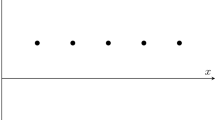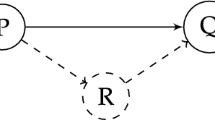Abstract
To determine whether dispositions are causally relevant, we have to get clear about what causal relevance is. Several characteristics of causal relevance have been suggested, including Explanatory Power, Counterfactual Dependence, Lawfullness, Exclusion, Independence, and Minimal Sufficiency. Different accounts will yield different answers about the causal relevance of dispositions. However, accounts of causal relevance that are the most plausible, for independent reasons, render the verdict that dispositions are causally relevant.
Similar content being viewed by others
References
Colin Allen (1995) ArticleTitle‘It Isn’t What You Think: A New Idea About Intentional Causation’ Nous 29 IssueID1 115–126
Ned Block (1990) ‘Can the Mind Change the World?’ Boolos George (Eds) Meaning and Method: Essays in Honor of Hilary Putnam Cambridge University Press Cambridge 137–170
Ned Block (1995) ‘Causation and Two Kinds of Laws’ MacDonald Cynthia (Eds) Philosophyof Psychology: Debates on Psychological Explanation Blackwell Cambridge 78–84
David Braun (1995) ArticleTitle‘Causally Relevant Properties’ Philosophical Perspectives: AI, Connectionism, and Philosophical Psychology 9 447–475
Anthony Dardis (1993) ArticleTitle‘Sunburn: Independence Conditions on Causal Relevance’ Philosophy and Phenomenological Research LIII IssueID3 577–598
Donald Davidson (1980) Essays on Actions and Events Oxford University Press Oxford
Frederick Dretske (1988) Explaining Behavior MIT Press Cambridge, MA
Douglas Ehring (1999) ArticleTitle‘Tropeless in Seattle: The Cure for Insomnia’ Analysis 59 IssueID1 19–24 Occurrence Handle10.1111/1467-8284.00143
B. D. Ellis (2001) Scientific Essentialism Cambridge University Press New York
Jerry Fodor (1989) ArticleTitle‘Making Mind Matter More’ Philosophical Topics 27 59–79
John Gibbons (2001) ArticleTitle‘Knowledge in Action’ Philosophy and Phenomenological Research 63 IssueID3 579–600
John Heil A. Mele (1991) ArticleTitle‘Mental Causes’ American Philosophical Quarterly 28 61–71
Hitchcock Read Christopher (1993) ArticleTitle‘A Generalized Probabilistic Theory of Causal Relevance’ Synthese 97 335–354 Occurrence Handle10.1007/BF01064073 Occurrence HandleMR1262829
Terrence Horgan (1989) ArticleTitle‘Mental Quasation’ Philosophical Perspectives: Philosophy of Mind and Action Theory 3 47–76
Frank Jackson (1995) ArticleTitle‘Essentialism, Mental Properties and Causation’ Proceedings of the Aristotelian Society 95 253–268
Frank Jackson Pettit Phillip (1990) ArticleTitle‘Program Explanation: A General Perspective’ Analysis 50 IssueID2 107–117
Jaegwon Kim (1991) ‘Epiphenomenal and Supervenient Causation’ Rosenthal David M. (Eds) The Nature of Mind Oxford University Press New York 257–265
Jaegwon Kim (1988) ArticleTitle‘Explanatory Realism, Causal Realism, and Explanatory Exclusion’ Midwest Studies in Philosophy XII 225–239
Jaegwon Kim (1989) ArticleTitle‘Mechanism, Purpose, and Explanatory Exclusion’ Philosophical Perspectives: Philosophy of Mind and Action Theory 3 77–108
Jaegwon Kim (1990) ‘Explanatory Exclusion and the Problem of Mental Causation’ Villaneuva Enrique (Eds) Information, Semantics and Epistemology Blackwell Cambridge 36–56
Ernest Lepore Loewer Barry (1987) ArticleTitle‘Mind Matters’ Journal of Philosophy 84 630–642
Ernest Lepore Loewer Barry (1989) ArticleTitle‘More on Making Mind Matter’ Philosophical Topics 17 175–191
Ludwig, Kirk: 1998, ‘Functionalism, Causation, and Causal Relevance’, Psyche, available from <http://psyche.cs.monash.edu.au/v4/psyche-4-04-ludwig.html>.
Cynthia MacDonald MacDonald Graham (1995) ‘How to be Psychologically Relevant’ MacDonald Cynthia (Eds) Philosophy of Psychology: Debates on Psychological Explanation Blackwell Cambridge 60–77
McLaughlin Brian P. (2002). ‘Type Epiphenomenalism, Anomalism, and Causal Priority’. Philosophical Perspectives.
Moliere (1935) Le malade imaginaire, comédie-ballet ... avec une notice biographique, une notice littéraire et des notes explicatives par René Vanbourdolle Librairie Hachette Paris
Prior W. Elizabeth Pargetter Robert Jackson Frank (1982) ArticleTitle‘Three Theses about Dispositions’ American Philosophical Quarterly 19 IssueID3 251–257
David-Hillel Ruben (1994) ArticleTitle‘A Counterfactual Theory of Causal Explanation’ Nous 28 465–481
Gabriel Segal Sober Elliot (1991) ArticleTitle‘The Causal Efficacy of Content’ Philosophical Studies 63 1–30 Occurrence Handle10.1007/BF00375995
Shoemaker, Sydney: 1980. ‘Causality and Properties’. in Peter van Inwagen (ed.), Time and Cause: Essays Presented to Richard Taylor, pp. 109–136.
Robert Stalnaker (1987) Inquiry MIT Press Cambridge, MA
Stephen Yablo (1992) ArticleTitle‘Mental Causation’ The Philosophical Review 101 IssueID2 245–280
Author information
Authors and Affiliations
Corresponding author
Rights and permissions
About this article
Cite this article
Mckitrick, J. Are Dispositions Causally Relevant?. Synthese 144, 357–371 (2005). https://doi.org/10.1007/s11229-005-5868-z
Issue Date:
DOI: https://doi.org/10.1007/s11229-005-5868-z




